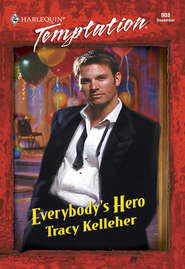По всем вопросам обращайтесь на: info@litportal.ru
(©) 2003-2025.
✖
The Company You Keep
Автор
Год написания книги
2019
Настройки чтения
Размер шрифта
Высота строк
Поля
Mimi stood there, barely keeping still, while Vic yanked his arm out of the sleeve of his soaking blazer…when…when she momentarily forgot her anger. Instead, she realized that when water comes in contact with a man’s dress shirt, it turns the material virtually translucent. Translucent and amazingly pliable, she couldn’t help noticing, as the thin cotton molded to Vic’s biceps and triceps, in addition to his well-contoured pectoral muscles.
She stopped in midstride, took a deep breath and willed herself to replay what he’d just said. “Details,” she scoffed in rebuttal. Vic Golinski wet might be better than any firemen’s pinup calendar, but that didn’t excuse his reactionary sentiments.
He loosened the knot of his orange tie and undid the top two buttons of his blue dress shirt. A few dark curls from his wet chest hair peeked out through the opening. “The devil is in the details,” he responded.
Mimi gulped and turned away. She exited the building and marched away from Baldwin Gymnasium where the panel had been held. She walked a short distance along the path, before she cut between two of Grantham’s Social Clubs, the university’s version of coed fraternities. Ahead lay the Alexander Hamilton School of International Studies, an elite branch of the university. She had wanted to ditch Vic, but he kept up stride for stride, shoulder to shoulder—forcing her to keep acknowledging his presence.
“You deserved that soaking—and more,” she muttered, her eyes focused on the uneven sidewalk. “What you said is just so infuriating…such a personal affront to me as captain of the water polo team, one of your so-called ‘minor sports.’” She raised her hands and gestured with her fingers to form quotation marks. “You have no idea what you are talking about.” Without bothering to look she jaywalked across Edinburgh Avenue, oblivious to the fact that she’d also crossed against the light.
Her statement was met by silence. Surprised, Mimi looked over her shoulder—and realized that Vic Golinski was waiting for the light to change and the “Walk” signal to flash. Mimi shook her head. “What’s the matter with you?” she scolded him. “There’s not a soul, let alone a car, in sight. Don’t you believe in taking the initiative?”
The light changed, and Vic stepped off the curb. “That’s no reason to disregard the rules,” he said patiently.
Mimi waited with hands on hips.
He stepped up next to her, towering over her despite her above-average height. “You may have gained some satisfaction in pouring water all over me, but this is my only dress shirt—and I need it for graduation in a few days.”
“I’ll get it dry cleaned for you.” She raised her chin.
He lowered his. “That’s your solution for everything, isn’t it? Throw money at it?”
Mimi didn’t back down. “Well, I hope you’re not expecting me to break out the ironing board.”
Vic narrowed his eyes. “Spoken like someone who was born with a silver spoon in her mouth. I bet you don’t even know how to iron.”
He was right, dammit. Mimi whipped around and marched on. On the right was the courtyard for Allie Hammie, as the Alexander Hamilton School was affectionately known. The whole area was paved in white marble, the same stone that clad the exterior of the school with its attenuated columns and narrow arcade. A row of magnolias ran along the far side, and in the center of the courtyard was an ornamental pool out of which rose an abstract metal sculpture. Water jets splashed its rusty surfaces and droplets bounced off and rained down to the water below.
Mimi stopped by the fountain and held up her arms in exasperation before letting them fall to her sides. “Okay, I’m sorry.” Her palms thwacked against her black trousers. “In hindsight, the powers-that-be never should have put us on that panel. Maybe they thought we would provide a student perspective besides the usual drivel from the administration flunky and the coaches. But you are clearly a throwback to some Neanderthal age.”
“Just because I don’t believe that there needs to be a comparable women’s team for every men’s athletic team, doesn’t make me a caveman. And I’m sorry if it offends you, but guys who are friends of mine on the wrestling team—who work their butts off—are pissed, rightfully pissed in my estimation, that their sport is being thrown on the trash heap because there’s no comparable women’s sport. Following that logic, what’s going to happen to the football program?”
“There’s nothing wrong with being a club sport.” That wasn’t quite true, as Mimi knew. Club sports received only small budgets, didn’t have paid coaches and didn’t travel.
“Then why don’t you petition for Women’s Water Polo team to be a club sport instead of varsity?”
“No way! That wouldn’t be fair because the men’s team has varsity status. You want that to become a club sport, too?”
“Of course not.” Vic ran his hand through the top of his brown wavy hair. He seemed entirely unaware that it stuck up like a lopsided Mohawk.
For someone intent on maintaining the status quo on and off the field, he looked remarkably off-kilter. Mimi had an intense desire to fluff up his hair even more, loosen him up and see what lay beneath his stuffed shirt exterior. Actually, she knew exactly what lay beneath his shirt—lots of well-developed muscles.
Vic seemed completely oblivious to Mimi’s inner ruminations. “Listen, all I’m saying is, before you—or anybody else for that matter—goes jumping into things, they need to weigh the pros and cons, evaluate a program over time, consider making adjustments when necessary. I’m not saying things can’t—or shouldn’t—change just that why rock the boat too much? Why not take it nice and easy?” He furrowed his brow. “Doesn’t that make sense?”
Raising one eyebrow, Mimi gave him a jaundiced view. “Are you always so cautious? Don’t you ever believe in taking risks? Are you always so slow to make up your mind about something?” It was a taunt, and she meant it.
“What are you talking about? Risk? I’ve been drafted into the NFL. A career in pro football is all about risk.”
Mimi waved off his question. “That’s all about seizing an opportunity. Because I bet even though you’re going to give the pros a chance, you have an airtight backup plan—maybe some trainee position at a bank or an acceptance to business school.”
Vic rubbed the sole of his black leather loafer on the sidewalk.
“Ah-hah!” Mimi shouted triumphantly. “I was right, wasn’t I?”
He shrugged. “Maybe. But some of us can’t simply plan on being world-renowned international correspondents.”
Mimi had voiced her post-graduation plans when she’d introduced herself at the start of the panel, minus the world-renowned part.
“We don’t just take off for parts unknown on the chance that we might run into some newsworthy event or use old family connections to get interviews with generals or presidents,” he continued. “Some of us need to think about things like paying back college loans and getting jobs that provide health insurance.”
“Oh, please, this is not about health insurance. Because, for your information, I’m not going into this as some rich girl hobby. For four years, after practice, I’ve slogged away at the Daily Granthamite, writing every kind of story under the sun.” She referred to the student newspaper that came out five days a week. “I’m not using my contacts. I’m cleaning out my bank account and getting a one-way ticket to Lebanon, and from there I’ll hunt down stories—stories about the real victims of this world.”
“And what if you don’t succeed? Then what?” he asked, his face getting closer to hers.
“Oh, I won’t fail. And I won’t give up,” she said with conviction. “Because to me, it’s worth whatever I have to do to expose the reality behind oppression, racism and especially wars. Wars aren’t just about soldiers. It affects the lives of everyday civilians—families, women and children. And if I run out of money because I can’t get someone to pick up my work, then I’ll simply keep writing until they do. I’m willing to take that chance because sometimes you just can’t take things slowly—moving only after you’ve weighed the pluses and minuses.”
Vic opened his eyes wide. “You’re crazy, you know that?”
Mimi laughed. “I may be crazy, but no one will be able to look back on what I’ve done twenty years from now and say, ‘Well, she might have made a good war correspondent—even a great one—but she spent too much time worrying about health insurance premiums.’” Then she stuck her finger out toward him. “And what will they be able to say about you? ‘When he was cut from training camp, he didn’t bother trying to get picked up by another team. He weighed the pros and cons and became an accountant instead.’”
Mimi glared at Vic, expecting him to argue, to say she didn’t know what she was talking about. But he was deathly quiet, menacingly silent. She back-pedaled a few feet, and stumbled against the low wall surrounding the reflecting pool. Spray from the fountain spattered over her head, beading on her ponytail and shoulders.
She saw him narrow his eyes and stare at her without blinking. Had she gone too far? she wondered. “Listen, maybe I shouldn’t have carried on like that, you know.” She tried to sound nonchalant.
He fisted his hands and took a step toward her.
Mimi stuck her tongue against the inside of her cheek. “You know, me and my big mouth. Sometimes I can’t stop myself—like pouring the water over your head.” She looked over her shoulder, then back at him. “So tell me,” she said brazenly, her chin high. “Should I feel worried here. Because, you know, I realize that aggression is an inherent element of your sport, especially for a linebacker. You’re a linebacker, right?” Mimi guessed, having never been to a football game in her four years at Grantham—a heresy, she knew, but it had been another way to avoid her father who never missed a home game.
“Right tackle,” he corrected, looming a little larger still.
She gulped. “I’m sure there’s a big difference. But the important point I’m trying to make is that off the field, physical violence never solved anything.”
“Maybe where you come from. But in my old neighborhood, it sure came into play.” He tossed his jacket to the ground and took another step, moving his massive body deep into her personal space. “Why is it, that as infuriating, as irritating, as arrogant as you are—you also sometimes make sense? I just hate that.”
Mimi frowned. She didn’t know whether to feel complimented or wary. “Are you admitting that I’m right?”
Vic moved until there wasn’t a millimeter of space between them.
She could feel his chest rise and fall, feel the heat generating from his skin and the cold wetness of his shirt. Immediately her nipples responded to the contrast, tightening into sensitive beads.
“The only thing I’m admitting is that there are times when you get under my skin,” Vic went on. “You don’t know me at all, yet you understand me in ways that even I sometimes don’t. How do you do that?”
“Innate brilliance? Extraordinary insight?”
He stared at her, turning his head this way and that, as if trying to analyze every curve of her face. “No, you’re smart, but I’m pretty sure I’m smarter. No offense.”
“I’m not so sure about that.” Actually, she was pretty sure, but she wasn’t going to admit it. She was no dope. She may have been a legacy admission—her family had been Grantham graduates and generous donors for generations—but she had been at the top of her class at prep school and had aced the college entrance exams. True, her grades in college weren’t exactly great, but then she had chosen to spend her time on sports, the newspaper and her social life.
Whereas Vic Golinski, despite devoting countless hours to football and the Big Brother program—she had listened to his introduction, as well—was graduating Phi Beta Kappa. In their junior year he had won the prize for the highest cumulative GPA for a student in the social sciences. Even if the guy spent every night in the library, he had to be extra smart to beat out all the other smart people at Grantham.











